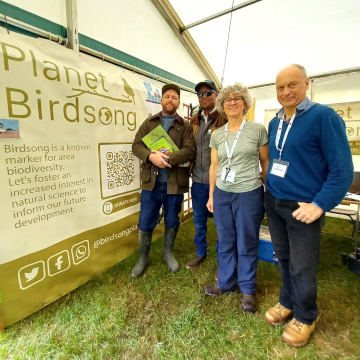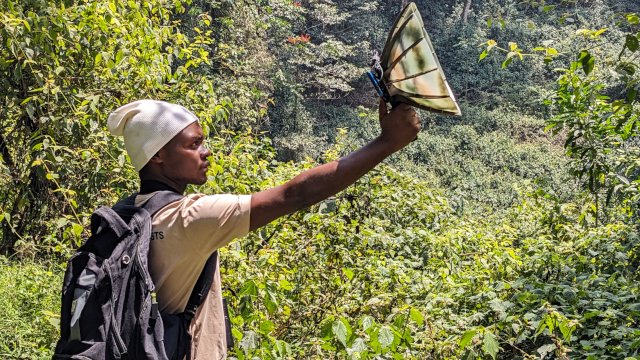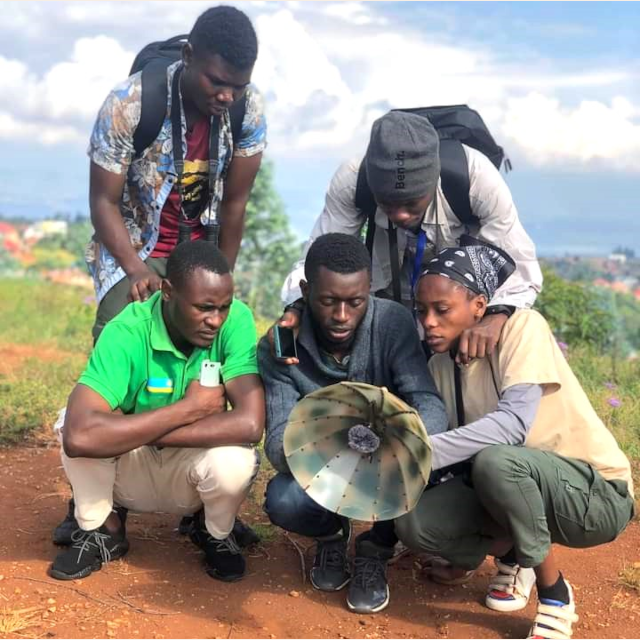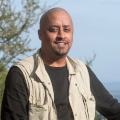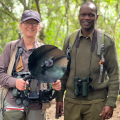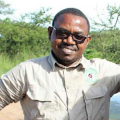The Planet Birdsong Foundation works with organizations of all sizes from
local to global.We work with schools, universities, community
organizations, arts organizations, conservation NGOs, and commercial
organizations that share an interest in conservation, for example
through tourism. We are running a case study for our proposed global
outreach model in partnership with
Centre of Excellence in
Biodiversity and Natural Resource Management at the University of
Rwanda. This will be the blueprint for new partnerships around the
world, in which local partners take the lead at a scientific, technical
or community level. We are working with the
eBird at the
Cornell Lab of Ornithology to evaluate the impact of our citizen
science on global data collection. We are currently planning new partnerships
in West Africa and Uganda.
The Planet Birdsong Foundation has a Memorandum of Understanding with the University
of Rwanda Centre of Excellence in Biodiversity and Natural Resource
Management (CoEB). This partnership aims to enable Rwandans to record
the acoustic characteristics and variations of all 700 bird species in
their country. Data collection and verification is managed in Rwanda; Planet Birdsong
provides mentoring and technical support.
We are developing citizen science programmes to increase local
engagement and expand participation in the programme. We deliver in-person training in Rwanda,
on-line webinars, and manage an active Whatsapp Group providing back up, tutoring and mutual contact
between citizen scientists and subject matter experts. This encourages mutual training amongst
the group, and enables us to adapt our training in response to citizen scientist activities. Our
Trustee Hilary MacBean has visited our established training hubs three times since 2020 and is planning
another visit in 2025. The training is modified through user experience, in response to citizen scientist
activities.
This year Planet Birdsong was awarded the
African Bird Club
Conservation Grant which facilitates four of our Rwandan recordists to initiate site visits and attend
training events. This recognises that, with appropriate training, African-based citizen science can
effectively contribute to mass data collection for conservation and future AI applications.
Lead Recordist Mbonigaba Jean de Dieu (Remy) is leading activity and providing local advice. It is our objective
to embed the entire project in Rwanda at an early date such that it is sustained in the long term.
We are also creating
bioacoustic games
which increase familiarity with Rwandan bird sounds, and plan to
install
birdsong studios at key biodiversity education hubs.
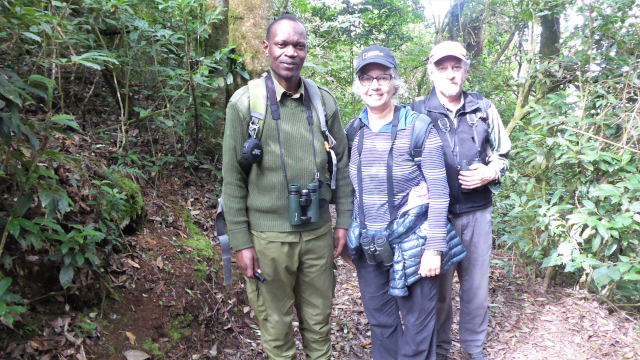
Claver Ntoyinkima and Beth Kaplin in the field
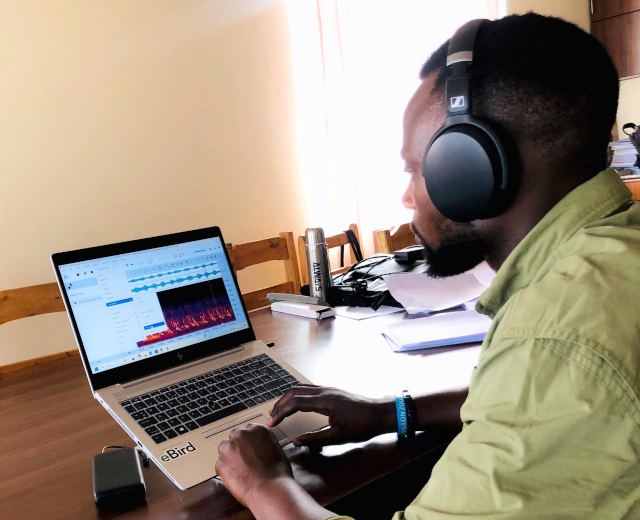
Lead Recordist Mbonigaba Jean de Dieu Remy works on audio processing.
Our main partner in Rwanda is Honorary Professor Beth Kaplin, Professor of Conservation Science in
the Biology Dept and former Director (2016-2023), of the Centre of Excellence in Biodiversity &
Natural Resource Management, a knowledge management research centre aimed at contributing
science to policy in support of the Rwandan Sustainable Development Goals, within the
College of Sciences and Technology at the University of Rwanda. She is also Research Professor
in the School for the Environment and Senior Fellow at the Center of Global Governance and
Sustainability, both at University of Massachusetts - Boston. Her current projects include
developing the Rwanda Biodiversity Information System (RBIS) as a repository of data for effective
policy-making. From 2006 to 2015, Professor Kaplin raised over 1 million USD from the MacArthur
Foundation to develop BSc and MSc programs in biodiversity conservation at the National University
of Rwanda. She also created the Regional Network for Conservation Educators in the Albertine
Rift to support and empower conservation scientists in Rwanda, Burundi, DRC, Tanzania, and Uganda.
She recognises the importance of avian taxa as indicator species and encourages ornithological
studies and the input of avian data to the RBIS, including data collected by Planet Birdsong
recordists. She has initiated a Memorandum of Understanding between the University of Rwanda and the
Planet Birdsong Foundation and together we seek funding to expand the collection of Rwandan/Albertine
Rift bioacoustic data.
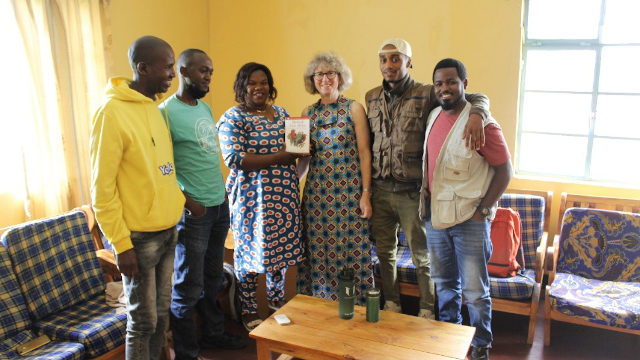
Collaboration with Conservation Heritage Turambe
Rwandan participants comprise students and academics in schools,
polytechnic colleges, and universities as well as working guides. We are
committed to work to internationally accepted qualitative standards and
specifications to ensure maximum value from the data. We are providing
as many participants as possible with access to recording equipment
consisting of
parabolic reflectors developed to be compatible with
locally available smartphones. Outstanding participants are be provided
with additional professional equipment to ensure that all Rwandan bird
species are recorded over a period of several years and some rarities are
recorded for the first time. Citizen scientist recordists are benefiting
from a rigorous data collection regime and learn new skills to take forward
into tourist guiding or other careers in the environmental sector. The process
is overseen by some of Rwanda’s finest ornithologists, who verify
recordings to be stored locally at the
Rwanda Biodiversity Information System and globally at
e-bird, creating a comprehensive
and readily accessible database of Rwandan bird sounds.
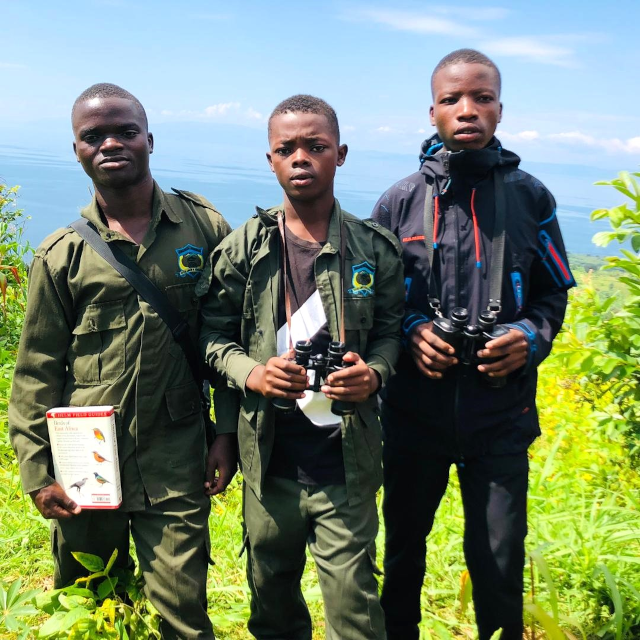
Students of Kivu Hills Academy Bird Club, a highly successful partnership.
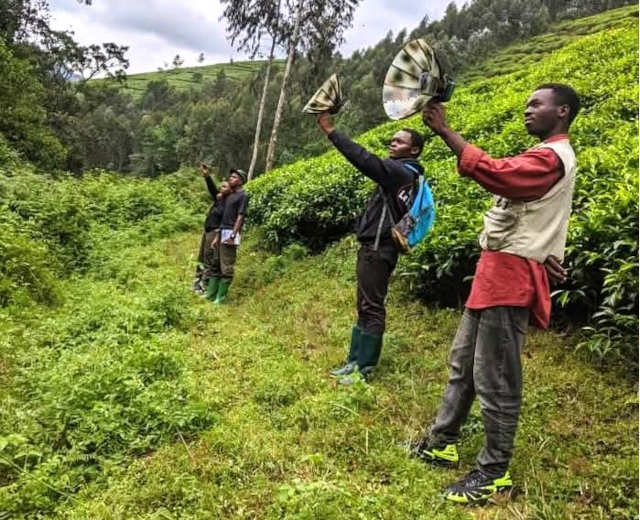
Field recording with students from IPRC Kitabi and partners, Rugezi Ornithology Centre
Our expert verifiers in Rwanda:
Gael Van de Weghe is a renowned naturalist, photographer and bird identification
verifier and the best known ornithologist in Rwanda. With his father, he is author of
Birds of Rwanda (2011, updated 2018), published by the Rwanda development Board.
He provides bird reporting services in Rwanda and maintains new sighting lists and updates,
all in support of Rwandan science and the growing number of active birders. He is a committed
supporter of the Planet Birdsong project in Rwanda.
Claver Ntoyinkima is actively verifying records on behalf of Planet Birdsong. He is based
in Nyungwe Forest National Park, where he has lived and worked as a guide for many years. He is an
expert ornithologist, guide, and trainer. He has contributed to papers, films and books and made a
noteworthy contribution to the “Wild Rwanda” by Behrens, Boix and Barnes (Lynx Edicions 2015).
Claver is well known for his almost unique capacity to vocalise birds sounds, particularly the
localised and often rare Albertine Rift Endemics. This skill is used to the full, to connect visiting
birders with elusive forest species. He is the winner of the Tusk Wildlife Ranger Award 2024.
Claudien Nsabagasani is an established birder, trainer and bird tour guide in Rwanda. Claudien
is actively verifying bird sound recordings made by citizen scientists contributors to the Planet Birdsong
project. He has initiated long term monitoring of both common and endangered species endemic to
the Albertine Rift. Claudien has contributed to the ecological studies of rare, endangered and endemic bird
species across Rwanda, Uganda and Burundi. He brings birding to the public, local communities and schools
through the Rwanda Birding Club and his company, Birding and Educational Tours - Rwanda.
Our success metrics include seeing participants actively
engaged in contributing to practical science at both local and international levels.
They are doing so as citizen scientists working within the scope of
sustainably implemented development projects and in wildlife tourism.
Find out more about our 2023 training trip
here.
A survey of participants trained in Rwanda revealed valuable information on the appetite
for citizen science in Rwanda, with strong organisation and motivation characteristics.
Around 50 citizen scientists have been trained and a core of around 20 are active at any
one time. In October 2024, an audit showed that 418 audio samples had been uploaded to
eBird. This is expected to be close to 500 by the end
of 2024. Key findings of the survey included the need for more user-friendly data capture
and upload systems and the need for more computer equipment and fieldwork resources.
In 2024 a high proportion of eBird data in Rwanda was contributed by Planet Birdsong
trained recordists; so we have been actively working with
eBird/
Cornell Lab of Ornithology to understand
and contribute to raw data collection in East Africa, towards the implementation of AI Apps
such as Merlin. This world-wide identification app is bringing bird sound to a much larger
audience and will make a significant contribution to AI bird identification, research in the
natural sciences and tourist guide and experiences, all benefitting sustainable economic development.
